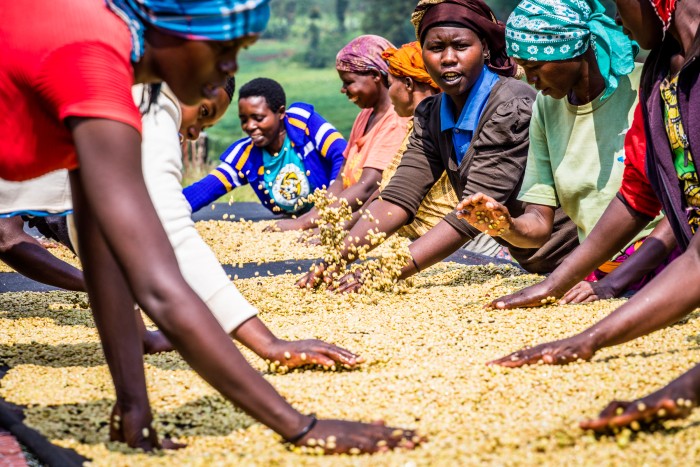E3G has assessed FMO as being “on its way to achieving full Paris Alignment” towards the goals set at COP 21 in Paris. After assessing nine Multilateral Development Banks (MDBs), FMO is the sixth Development Finance Institution (DFI) and the first one with a private sector focus only, that has been assessed using the E3G Public Bank Climate Tracker Matrix under the category ‘bilateral and national bank’.
FMO is pleased with this confirmation that we are on our way towards full Paris alignment and welcomes the publication of this assessment by E3G, a renowned, independent climate change think tank.
E3G is the developer of the ‘E3G Public Bank Climate Tracker Matrix’, an online tool that uses 15 metrics to assess the degree of Paris Agreement alignment that a DFI has achieved. Using a combination of internal bank documents and external information sources, the Public Bank Climate Tracker Matrix provides a summary of how public banks mainstream climate action through their activities and policies. The Public Bank Climate Tracker Matrix strives to help DFIs identify priority actions that each bank should take to align to a pathway towards the goals of the Paris Agreement and to reach net zero by 2050.
E3G’s review considered FMO’s work up to 2023 and the work we are currently undertaking toward meeting our goals and commitments. We are pleased that E3G has recognized the strength of our climate action and ongoing efforts toward Paris Alignment in their assessment. They highlight three key areas where FMO is relatively advanced:
Climate change is effectively mainstreamed throughout FMO’s core strategic documents.
For more information on this please look at FMO’s Strategy towards 2030, which includes our strategy related to SDG 13, Climate Action. Following this, we published our first Climate Action Plan in December 2022, which outlines how we will meet our climate strategy in the coming years.

FMO has strong procedures in place for GHG accounting and reduction.
For more information on GHG accounting please visit the Joint Impact Model (JIM) that FMO helped establish in 2019. The JIM is central to how we measure our impact at FMO, which includes our GHG emissions. Our commitment towards net-zero emissions in our portfolio in 2050 is part of the Strategy towards 2030 and Climate Action Plan.
FMO has committed to fossil fuel phase-out by 2026 for direct investments, having developed comprehensive ‘Transition Criteria’ for the interim.
For more information, please refer to FMO’s exclusion list and our related transition criteria which are set out in our Position Statement on Coal and on Phasing Out Fossil Fuels.
E3G also highlights three areas for improvement which are:
FMO should implement a zero net deforestation target and a screening process for biodiversity positive co-benefits across the board.
At FMO we recognize the world’s forests are under threat. Therefore, we invest in sustainable forestry to contribute to curbing deforestation. We do this within the framework of the IFC Performance Standards, specifically PS6 Biodiversity Conservation and Sustainable Management of Living Natural Resources. Also, in the FMO exclusion list, we exclude activities that contribute to the destruction of High Conservation Value areas, thereby excluding many activities negatively impacting natural forests. With this, we do have a framework and operational system in place for avoiding deforestation, and for mitigating and offsetting negative impacts on critical habitats in general. We do strive to continuously improve our work and will consider E3G’s recommendation to implement a net zero deforestation target or other mechanism to be even more impactful in this area. We also recognize the fast-evolving field of investing in projects with biodiversity benefits and are actively exploring how to invest more in this field.
FMO should develop country-level strategies (in a manner that reflects their capacity) to guide their engagement with customers.
We are pleased that the assessment recognizes that there are capacity challenges faced by private-finance DFIs like FMO, that do not have the same capacity as large public development banks in terms of working with country strategy approaches. At FMO we have chosen to organize our work according to the three sectors that we invest in[1], and not primarily according to the countries that we work in. We continuously work to improve alignment and coordination of customer engagement between the three sectors in each country, and we expect to use a similar approach towards Paris Alignment. In addition, we expect our Paris Alignment work to be informed by, for example, country climate and sector strategies and the World Bank Country Climate and Development Reports, and we will continue to play an active role in coordinating our in-country work and strategies with other DFIs and investors.

FMO should enhance its climate finance transparency.
In 2023 FMO has updated its Customer Disclosure policy, thereby disclosing more information about our investments and making it easier to track and access the information. We recognize that this is a continuously evolving field, and we are working to improve the information available and the accessibility of that information. We will take along E3G’s suggestions in continuing our efforts towards more transparency about our investments.
Besides these six highlighted fields, FMO will further evaluate the assessment and recommendations to inform our approach as we advance towards full Paris Alignment.
Concluding how Paris-aligned a DFI is, is not an easy task. The Climate Tracker Matrix provides a schematic overview with set criteria that assume a certain set of activities by most public development banks. For example, while FMO invests in energy access and it is a key priority for us, it is an area of investment embedded in our much broader energy sector strategy unlike some other development banks, where this may be a focus on its own.
Engage with FMO on the Climate Tracker Matrix

E3G has processed the detailed data received from FMO into an assessment that provides an overview according to its 15 metrics of Paris alignment. Therefore, at FMO, we hope that the readers of the Public Bank Climate Tracker Matrix will recognize it as a ‘snapshot’ in 2023 of FMO’s ongoing process of implementing our climate strategy as set out in our Strategy 2030 and our Climate Action Plan. We view most of the conclusions and recommendations made by E3G as fair, but it is important to note that we do have further specifications and comments for the conclusions of the metrics that were measured. We welcome the readers of the Public Bank Climate Tracker Matrix to reach out to FMO to verify conclusions and recommendations in it or if you want to learn more about FMO’s work. We thank E3G for their engagement with FMO, for taking the time to review our efforts, and for sharing their valuable insights with us.
Please find the assessment here.
[1] Agribusiness Food and Water, Financial Institutions, and Energy




